What Next for the Call of Duty Series?
2016 IN REVIEW: After years of increasingly futuristic-themed games, is it time for the Call of Duty series to return to its historical roots?
This article first appeared on USgamer, a partner publication of VG247. Some content, such as this article, has been migrated to VG247 for posterity after USgamer's closure - but it has not been edited or further vetted by the VG247 team.
Over the past 13 years, the Call of Duty series has evolved from a historical military shooter into… a futuristic military shooter. Actually, putting it that way does the series a serious disservice in terms of how far it has actually come from its World War II-oriented early days, but on the other hand, it does bring into sharp focus one of Call of Duty's major challenges, and that's the fact that every year there's a new iteration of the game that needs to bring something new to the table while staying true to the series' fundamental formula.
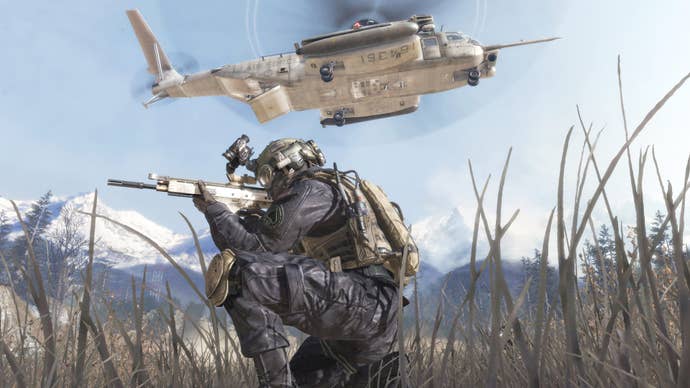
That path of incremental development has often been the subject of criticism, but despite its conservative evolutionary tack, Call of Duty has become one of the World's most successful entertainment brands: This year, lifetime franchise unit sales crossed the 250 million mark. That's an astonishing volume of games that has swelled publisher Activision's coffers by a mind-boggling $11 billion-plus in revenue.
With those numbers in mind, it's small wonder that Activision is so loath to experiment with the series. With multi-millions of dollars in profit at stake, the last thing the company wants to do is alienate its player base with something new-fangled that doesn't necessarily resonate with the Call of Duty faithful. However, at the same time, by not innovating, is Activision in danger of seeing its audience eroding over time as players eventually burn out on the Call of Duty formula?
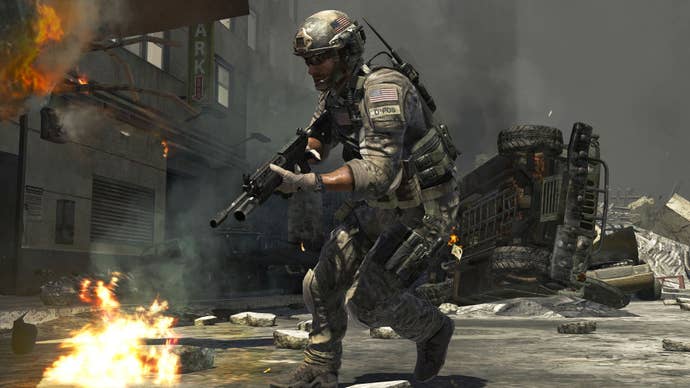
Current data doesn't necessarily support that theory. Call of Duty series sales have ebbed and flowed over the years. The best-selling game of the early years was the 2004 release, Call of Duty: Finest Hour, which thanks to the franchise shifting from PC exclusivity to also being available for PS2 and Xbox helped the game sell 10 million units. Three years later, Call of Duty 4: Modern Warfare sold 18 million copies, and its sequel, Modern Warfare 2, posted even more impressive numbers – selling through almost 30 million units in 2009. The Black Ops games are also responsible for some big figures, with the original 2010 game selling almost 26 million copies, its 2011 sequel hitting 30 million, and the third 2015 game selling a series high of 32.5 million.
When you take in those statistics, it's easy to see exactly why the Call of Duty franchise is what it is. While critics might complain every year that the series lacks innovation, judging by its sales numbers, it's delivering exactly what the audience wants.
Or is it?
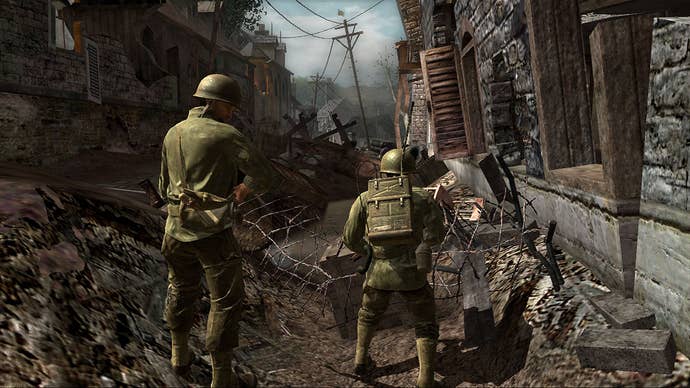
Over the past few weeks, there have been several NPD reports stating that this year's Call of Duty release, Infinite Warfare, is selling very slowly, with physical sales dropping 50% year on year compared to Black Ops III. Of course, physical sales might be down because players are buying the game digitally, but I would be very surprised if there was that much of a shift in terms of consumer purchasing habits within a twelve-month period. I think the reality is that players just aren't quite as interested in Infinite Warfare as they were with Black Ops III, a name that's synonymous with the best Call of Duty games around.
There was evidence of this when the Call of Duty: Infinite Warfare reveal trailer drew a record number of dislikes. Currently, the YouTube video has just over half a million likes, and an astonishing 3.4 million thumbs-down. It seemed that many fans were keen to send Activision a message about what they felt upon viewing yet another futuristic Call of Duty game. Or maybe they were expressing their displeasure after discovering that they'd have to buy a premium-priced edition of Infinite Warfare to secure a copy of Modern Warfare Remastered? Either way, it's apparent that Infinite Warfare just didn't garner the buzz and anticipation that Black Ops III did ahead of its launch.
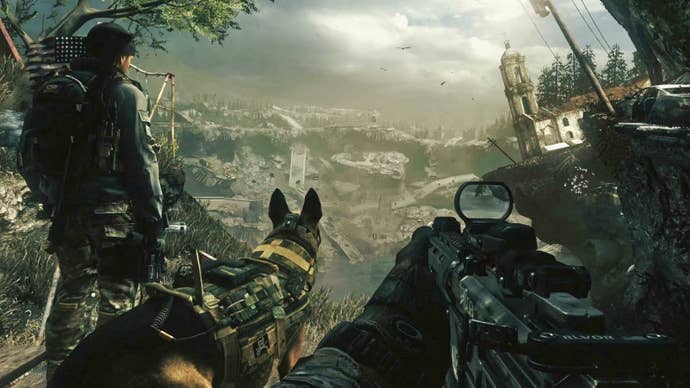
On the face of it, negative reviews certainly don't seem to be the reason for the game's lack of immediate success. Infinite Warfare was largely very well received by critics, with the most commonly-reviewed PS4 version scoring 77 on Metacritic, only slightly behind the 81 rating garnered by last year's runaway sales driver, Black Ops III. However, reading between the lines, while Infinite Warfare was lauded for being very slick and polished, many cited the game's multiplayer and zombies modes as feeling like all-too-familiar retreads of Black Ops III. I said as much in my review, adding that as a big fan of the series, "I'll play the game and have fun while doing so, but I'm just not as excited and enthused about it as I was with Black Ops III – and I don't see it holding my attention for anywhere near as long, either."
The most positive feedback was reserved for the game's campaign, which many reviewers – including me – felt was the most interesting and compelling the Call of Duty series has seen in years. However, despite its futuristic setting and occasional flight combat mission, the reality is that the campaign played it very safe. Sure, it's exceptionally well produced, has good characters, and memorable moments of bombast, but most of its fundamental gameplay boils down to corridor shoot 'em up segments that follow a well-worn groove. Perhaps some players are finally getting fed up with that formula? Maybe the franchise's increasingly sci-fi bent is proving a long-term turn off? Or could it be that the game's sales were undermined by similar products being released around the same time in the form of Battlefield 1 and Titanfall 2?
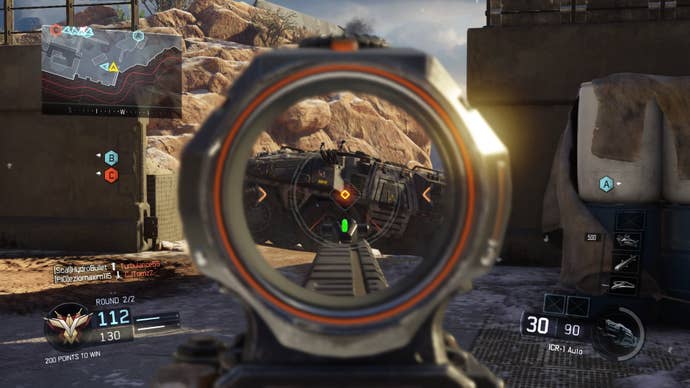
Whatever the reason, I think it'll take a while for us to really get a proper grip on why Infinite Warfare isn't selling as strongly as previous Calls of Duty – and maybe its long-term sales will actually prove to be more positive than current figures are leading us to believe. But what is clear is that this year's release hasn't motivated fans of the series as strongly as games of yore. So what might that mean for the future?
Well, what's pretty obvious is that Call of Duty isn't going anywhere anytime soon. Despite flagging sales this year, the series is still a success story that most software companies would envy. Some feel that Activision should follow Ubisoft's Assassin's Creed example, and give Call of Duty a year off to rethink the series (which would be the first time the game has skipped an annual release since 2004). Personally, I just don't see that happening with three major developers working on individual titles on a rotational basis. The cost would be huge, both in terms of money already invested, and the potential loss of revenue. Maybe I'll be surprised, but Activision just doesn't strike me as a company that would do this.
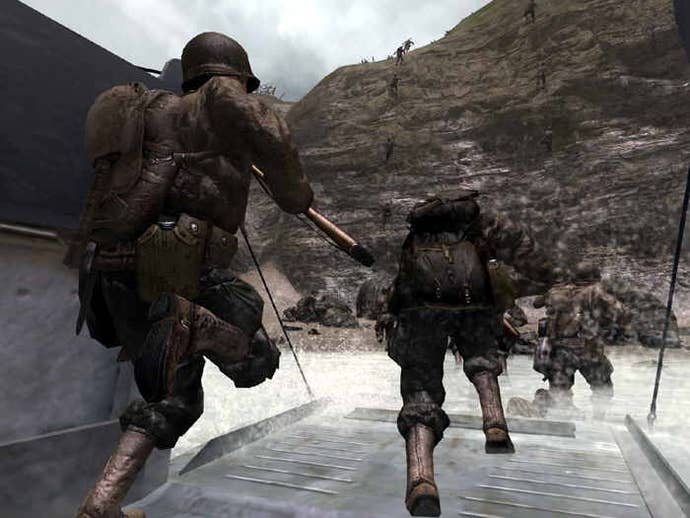
Perhaps it's time to take the series back to its historical roots? That would be a great change-up for the franchise, and one that would very likely be welcomed by fans. After Battlefield 1's success this year, it appears that many players are more than happy to buy historical shooters if they're of a high enough quality. Audio-visuals have evolved exponentially in the decade since Call of Duty shed its World War II heritage and entered the Modern age, and taking the series back to basics could deliver something really quite spectacular.
If it did take that route, though, what would it mean for the eSports side of the game? Would eschewing the wall-running, high-octane pace of the current Call of Duty multiplayer format negatively impact eSports participation and viewership? I'm not sure that it necessarily would. One thing that Call of Duty: Modern Warfare Remastered's multiplayer aspect has shown us is that an oldschool game can still be tremendous fun, both to watch and to play. As long as it's well designed and balanced, there's no reason why a historical shooter would have to be a step back for competitive multiplayer.
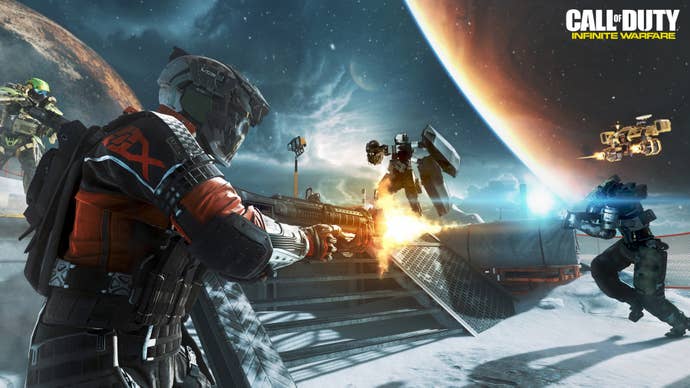
Looking at the Call of Duty schedule, Sledgehammer Games is up for next year's iteration, which, if it follows the anticipated release pattern, would be Advanced Warfare II. Interestingly, though, a few years ago Sledgehammer Games worked on a third-person Call of Duty action adventure set during the Vietnam War that was known internally as Fog of War. While the project was canceled – apparently due to Activision's belief that marketing a game based on a controversial recent war would be a major challenge – it's nevertheless evidence that there has been internal support at the company for a potential new direction for the Call of Duty brand.
Perhaps we'll end up being surprised by next year's Call of Duty? Then again, maybe the fact that Advanced Warfare sold quite well – just shy of 22 million units – will mean that Activision will instead trot out a safe sequel to Sledgehammer Games' inaugural release as lead developer. If that happens, I'll definitely be disappointed. While I did enjoy Advanced Warfare, the prospect of another Call of Duty that features suit-enhanced combat – no matter how refined and polished it is – just doesn't fill me with excitement. The last three games have all riffed on that premise, and the future is getting old.
Maybe the way forward really is for the series to step back into the past?
